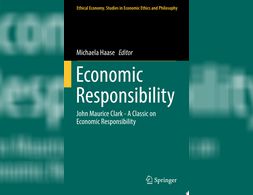✕
112 results
Approaching the law of nature that determines all forms of economy. The bulk of economic theory addresses the economic process by setting out on a catalogue of aspects, seeking the laws in the aspects and hoping to get together a reliable view of the whole.
In this essay the author reviews empirical studies in economics that analyze factors behind the rise of nationalist and populist parties in Western countries. He stresses that economic factors (e.g., trade shocks and economic crisis) play a crucial role in the rise of populist parties; however, the discussion of mechanisms driving this trend remains unsatisfying
In this essay the authors take a look at how welfare could be provided in a degrowth society.
What are the implications of the politics of "behavioural change"? Alexander Feldmann took a closer look for you on nudging and framing and if this is a legitimate instrument being used by the state to make us behave better in terms of our carbon footprint.
In this short video behavioural economist, Dan Aerily talks about how our cognitive illusions will trick us into believing something that is otherwise deemed irrational by the homo economicus. It raises and probes into some very interesting questions that defy the neoclassical rational behaviour.
An essay of the writing workshop on contemporary issues in the field of Nigerian economics: Labour and all the dynamics, such as laws, mobility, gender participation, regulation etc., that are associated with it cements the need for this paper which seeks to objectively review, analyse, and if deemed necessary, give plausible recommendations.
It is perhaps fitting that the seriousness of the coronavirus threat hit most of the Western world around the Ides of March, the traditional day of reckoning of outstanding debts in Ancient Rome. After all, problems and imbalances have accumulated in the Western capitalist system over four decades, ostensibly since it took the neoliberal road out of the 1970s crisis and kept going along it, heedless of the crises and problems it led to.
Steve Keen analyses how mainstream economics fails when confronted with the covid-19-pandemic. Mainstream economics has propagated the dismantling of the state and the globalization of production - both of which make the crisis now so devastating. More fundamentally, mainstream economics deals with market systems, when what is needed to limit the virus’s spread is a command system.
Economists like to base their theories on individual decision making. Individuals, the idea goes, have their own interests and preferences, and if we don’t include these in our theory we can’t be sure how people will react to changes in their economic circumstances and policy. While there may be social influences, in an important sense the buck stops with individuals. Understanding how individuals process information to come to decisions about their health, wealth and happiness is crucial. You can count me as someone who thinks that on the whole, this is quite a sensible view.
One of the pluralist theories which has gained prominence following the 2008 financial crisis is Hyman Minsky and his Financial Instability Hypothesis (FIH). Minsky was unique in viewing balance sheets and financial flows as the primary components of capitalist economies, and his focus on the financial system meant he was well-equipped for foresee a crisis much like 2008. Although he died long before 2008 his framework anticipated many of the processes which led to the crash, particularly increased risk-taking and financial innovation which would outstrip the abilities of regulators and central banks to manage the system.
Feminist economics is a key component of the movement for pluralism in economics and one that has, to some extent, been acknowledged by the mainstream of the profession. It seeks to highlight issues which affect women because (it claims) they have not traditionally been recognised in a field dominated by men. On top of this, it seeks to carve out a space for women in the discipline, both for intrinsic reasons of fairness and diversity and because it means that women’s issues are more likely to be highlighted going forward.
The global financial crisis (GFC) led to increasing distrust in economic research and the economics profession, in the process of which the current state of economics and economic education in particular were heavily criticized. Against this background we conducted a study with undergraduate students of economics in order to capture their view of economic education.
This module examines current socio-political issues through the lens of pluralism, that is pluralism of theory, pluralism of method and interdisciplinary pluralism
Introduction Economics is by necessity a multi paradigmatic science Several theoretical structures exist side by side and each theory can never be more than a partial theory Rothschild 1999 Likening scientific work to the self coordinating invisible hand of the market Michael Polanyi cautioned strongly against centralized attempts to steer …
What made the false assumption that saving the economy at all cost during a pandemic so popular? This paper discusses different pathways through the COVID-19 pandemic at national and international level, and their consequences on the health of citizens and their economies.
This course will fundamentally ask whether we can, or even should use the word ‘decolonising’ in our pursuit of a better economics?
Pluralism includes mainstream economics. Our campaign for pluralism, including this series, have generally focused on ideas outside the mainstream on the basis that it gets plenty of attention already so we want to spend our time exposing people to alternatives. Nevertheless, mainstream ideas deserve some attention. On top of this, a curious feature of modern economics education is that some of the best ideas from mainstream economics are not even taught to undergraduates! During this series I will explore such ideas, starting today with the market construction technique known as ‘matching’.
Jason Collins explains how his evolutionary approach to decision making relates to other approaches of behaviour This piece therefore not only serves as a good introduction to this evolutionary approach but also serves as a great introduction to these other approaches of behaviour namely neoclassical perfect rationality which involves mainly …
This article by Rüdiger Bachmann et.al. discusses the economic effects of a potential cut-off of the German economy from Russian energy imports.
Behavioural economics deals with observing behaviour and economic decision making behaviour.
Turning the ideas of #DoughnutEconomics into action.
Institutional economics focuses on the role of social institutions in terms of laws or contracts, but also those of social norms and patterns of human behaviour that are connected to the social organisation of production, distribution and consumption in the economy.
John Maurice Clark’s article “The Changing Basis of Economic Responsibility,“ published in the Journal of Political Economy, is the topical starting point for all scholars interested in economic responsibility and responsible economic action.
As a response to ongoing economic, social and environmental crises, many private actors have enlarged their definition of 'value' to include environmental and social elements. Such practices, however, appear incompatible with the current epistemological structure of academic financial discourse.
This article outlines the fundamental challenges of democratically planned economies and categorises proposed models into six groups, each of which approaches planning and coordination at different levels of authority and between myriad economic units in a particular way, taking into account efficiency as well as democratic principles and environmental and social sustainability. Through a classification system based on decision-making authority and mediation mechanisms, the article provides a framework for understanding and comparing these models. By examining their different approaches, it offers insights into the complexities and potential paths of democratically planned economies in the 21st century.
That’s why it is time, says renegade economist Kate Raworth, to revise our economic thinking for the 21st century. In Doughnut Economics, she sets out seven key ways to fundamentally reframe our understanding of what economics is and does.
Finance at the Threshold offers a unique perspective from an English economic and monetary historian. In it the author asks: Why did the banks stop lending to one another, and why now? Was it merely a matter of over-loose credit due to the relaxation of traditional prudence, or did global finance find itself at its limits?
It has become a contentious term in- and outside of economic policy: austerity. Allegedly the culprit behind the shortfalls of governments' reaction to the Great Financial Crisis, the policy makes for a spirited debate.
In the late nineteenth and early twentieth centuries, Bombay was beset by crises such as famine and plague. Yet, rather than halting the flow of capital, these crises served to secure it. In colonial Bombay, capitalists and governors, Indian and British alike, used moments of crisis to justify interventions that delimited the city as a distinct object and progressively excluded laborers and migrants from it.
This book highlights the political economy of wealth and income inequality in Latin America. The author segments his analysis to separately evaluate the economic, social, and political costs of inequality building on country case studies. It draws well-contextualized lessons from the Latin American experience that is important to consider for other regional contexts, especially for social policies of nations within the 'Middle Income Trap'.
Work defines who we are It determines our status and dictates how where and with whom we spend most of our time It mediates our self worth and molds our values But are we hard wired to work as hard as we do Did our Stone Age ancestors also live …
Philosophy of Economics: A Contemporary Introduction is the first systematic textbook in the philosophy of economics introduces to the epistemological, metaphysical and ethical problems that arise in economics, and presents detailed discussions of the solutions that have been offered.
We use cookies on our website. Click on Accept to help us to make Exploring Economics constantly better!































